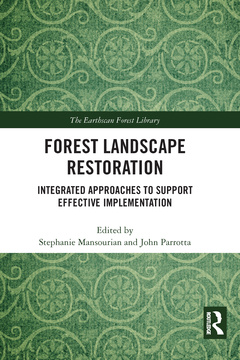Description
Forest Landscape Restoration
Integrated Approaches to Support Effective Implementation
The Earthscan Forest Library Series
Coordinators: Mansourian Stephanie, Parrotta John
Language: English
Subjects for Forest Landscape Restoration:
Keywords
Large Scale Forest Restoration; Forest Restoration; Forest Management; Degraded Forest Landscape; Forest Conservation; Bonn Challenge; Deforestation; Forest Landscape; Forest Governance; Integrated Landscape Approaches; John Parrotta; Polycentric Governance; Rachel Carmenta; SES Framework; Bhaskar Vira; Local Knowledge; Frank K; Lake; Redd; Christian P; Giardina; Land Sparing; Iain Davidson-Hunt; Western Knowledge Systems; Nitin D; Rai; Traditional Knowledge Systems; Suhas Bhasme; IPBES; Poorna Balaji; Forest Loss; Anastasia Yang; Ecosystem Services; Imogen Bellwood-Howard; Restore Forest Landscapes; Melvin Lippe; Community Based Forest Management; Jeffrey Sayer; Agni Klintuni Boedhihartono; Leasehold Forestry; Agnieszka E; Latawiec; Peatland Restoration; Juliana Silveira dos Santos; Legal Tenure; Veronica Maioli; Land Sharing; André B; Junqueira; Sustainable Intensification; Renato Crouzeilles; Forest Land Tenure; Catarina C; Jakovac; Fernanda Tubenchlak; Bernardo B; N; Strassburg; Kristina Van Dexter; Ingrid Visseren-Hamakers; Wil de Jong; Marieke van der Zon; Andrea Flores Urushima; Yeo-Chang Youn; Jinlong Liu; Ning Li; R; Patrick Bixler; Theresa Jedd; Carina Wyborn; Yadav Uprety
Publication date: 06-2020
· 15.6x23.4 cm · Paperback
Publication date: 08-2018
· 15.6x23.4 cm · Hardback
Description
/li>Contents
/li>Readership
/li>Biography
/li>
Forest landscape restoration (FLR) is a planned process that aims to regain ecological integrity and enhance human wellbeing in deforested or degraded landscapes. The aim of this book is to explore options to better integrate the diverse dimensions - spatial, disciplinary, sectoral, and scientific - of implementing FLR.
It demonstrates the value of an integrated and interdisciplinary approach to help implement FLR focusing specifically on four issues: understanding the drivers of forest loss and degradation in the context of interdisciplinary responses for FLR; learning from related integrated approaches; governance issues related to FLR as an integrated process; and the management, creation and use of different sources of knowledge in FLR implementation. The emphasis is on recognising the need to take human and institutional factors into consideration, as well as the more obvious biophysical factors. A key aim is to advance and accelerate the practice of FLR, given its importance, particularly in a world facing increasing environmental challenges, notably from climate change.
The first section of the book presents the issue from an analytical and problem-orientated viewpoint, while later sections focus on solutions. It will interest researchers and professionals in forestry, ecology, geography, environmental governance and landscape studies.
Part I: Why Integration Matters 1. The Need for Integrated Approaches to Forest Landscape Restoration 2. Integration for Restoration: Reflecting on Lessons Learned from Past Silo Strongholds 3. Considering Diverse Knowledge Systems in Forest Landscape Restoration 4. Power, Inequality and Rights: A Political Ecology of Forest Restoration Part II: Approaches, Systems and Processes 5. Social-Ecological Systems and Forest Landscape Restoration 6. Integrated Landscape Approaches to Forest Restoration 7. Forest Landscape Restoration and Land Sparing-Sharing: Shifting the Debate towards Nature’s Contribution to People 8. Linking forest conservation and food security through agroecology: insights for Forest Landscape Restoration Part III: Integrated Decision-Making in Forest Landscape Restoration 9. Stakeholders and Forest Landscape Restoration: Who decides what to restore, why and where? 10. Tenure, Property Rights and Forest Landscape Restoration 11. Polycentric Governance and Forest Landscape Restoration: Considering Local Needs, Knowledge Types, and Democratic Principles 12. Integration of Traditional and Western Knowledge in Forest Landscape Restoration Part IV: Synthesis and Conclusions 13. Putting the Pieces Together: Integration for Forest Landscape Restoration Implementation
Stephanie Mansourian is an environmental consultant with a special interest in the restoration of forested landscapes and governance challenges related to large scale forest restoration. For five years she managed WWF International’s forest landscape restoration programme. As a consultant since 2004, she has been involved in a range of international environmental work including studying lessons from past FLR work, analysis of the SDGs, assessing governance challenges of FLR, as well as broader environmental project development and evaluation work. She has a PhD in Geography from the University of Geneva, Switzerland, where she is also a research associate.
John Parrotta is the national programme leader for international science issues with the USDA Forest Service’s Research & Development branch, and currently serves as a vice-president of the International Union of Forest Research Organizations (IUFRO). His research experience and publications include work related to tropical forest ecology, silviculture, forest restoration, and traditional forest-related knowledge. He is a coordinating lead author of the 2018 Intergovernmental Science-Policy Platform on Biodiversity and Ecosystem Services (IPBES) thematic assessment report on land degradation and restoration.




